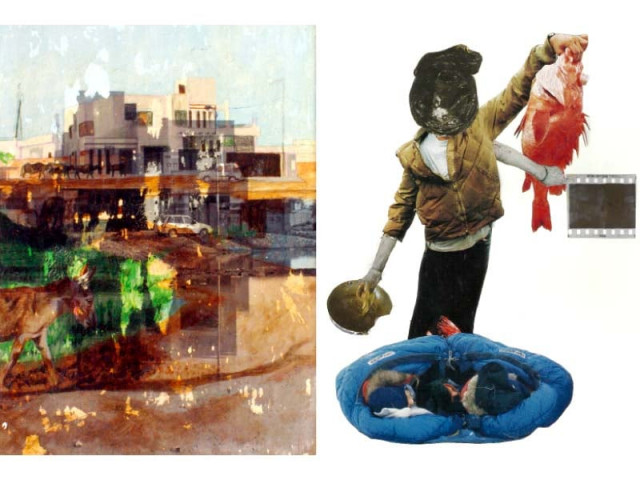Afterimages: The rise of the machines or the fall of man?
Artworks at IVS Gallery depict our obsession with technology.

Lahore-based artists Zoha Khan and Nisha Hasan are currently displaying their works at IVS Gallery. While Khan comments on man’s dependence on man-made objects in her art, Hasan reflects on man’s claim to superiority over other beings, such as animals. PHOTOS: COURTESY IVS GALLERY
To add to the viewer’s sensory stimulation, Hajra Haider has exhibited some great curatorial skills. As artist Suleman Khilji points out, she played with gallery space and the placement of images. The gallery is divided in two sections, each holding one artist’s works. Take a stroll through both the sections and you will feel like you have taken a small journey.
“Earlier, I used to work with figures at [National College of Arts] NCA,” she told The Express Tribune. “I used to make huge canvases of 5x7 feet.” She added that she wanted to move away from figures and towards objects in her art. She experimented with objects; first interior and then exterior, as shown by her works, too.
Most of her works depict images of objects, such as fans, gas cylinders and generators. She explained that since she belongs to Lahore, her works reflect on the way these man-made machines have become so important in life that we can’t stop thinking and worrying about them.
This idea was reinforced by both Khilji and Haider. Khilji, who was in the same batch as Khan, described how he has seen Khan’s works from the beginning. He talked about her shift of character, that is, the human in her work replaced by machines. “This is the idea of man being replaced by man-made objects.”
According to Haider, as technology keeps getting more advanced and sophisticated, the behaviour of man becomes more rigid and animalistic. “Zoha talks about how things become more important than human beings,” she said. “These things are no more than just support material. Yet, they have become something that you depend upon instead of the human relations around you. Now you have more of a connection with your technology, for instance your phone, than you have with anyone else around you.”
Coming over to Hasan’s works, Haider was of the view that the artist has taken up a ‘sort of a post-apocalyptic scenario’ in which she talks about what the future is going to be. “We always think that we are superior to animals because we have the power to think,” said Haider. “But what about the things we have made with this power to think? We have become slaves to the things we created.”
The validity of man’s claim to supremacy over animal reverberates in her works. One of her artworks depicts a scene that evokes the image of a chicken being slaughtered - this is an important aspect of her work: nothing is absolute, the works are ambiguous and you may give them your own meanings. The image of the chicken being held in the hand of a man-like figure is vague. Sometimes it looks like a chicken, at others it looks like a human heart. Whatsoever it may be, the comment is on man’s cruelty.
Talking about the works in general, Haider said that as technology becomes more sophisticated and slick, we become so engrossed in it that we are hardly left with any time for reflection. “We consider animals inferior but, for Nisha, there comes a point when we all become the same: death,” said Haider. “When you and the animals die, you come to the same equal level.”
The show, titled ‘Afterimages’, continues till April 1.
Published in The Express Tribune, March 22nd, 2015.



















COMMENTS
Comments are moderated and generally will be posted if they are on-topic and not abusive.
For more information, please see our Comments FAQ